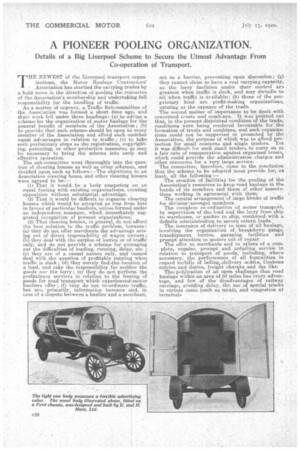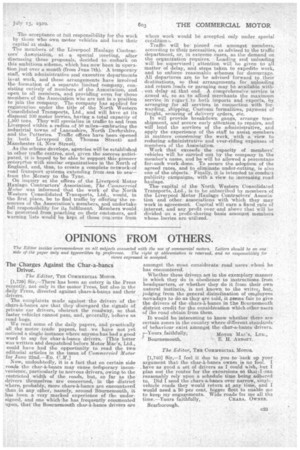A PIONEER POOLING ORGANIZATION.
Page 20

Page 21

If you've noticed an error in this article please click here to report it so we can fix it.
Details of a Big Liverpool Scheme to Secure the Utmost Advantage From Co-operation of Transport.
THE NEWEST Of the Liverpool transport organizations, the Motor Haulage Contractors'
' Association has startled the carrying trades by a bola move in the direction of pooling the resources of the Association's membership and undertaking full responsibility for the handling of traffic.
As a matter of urgency, a Traffic Sub-committee of the Association was formed a, short time ago and
their work fell under three headings: (a) to advise, a teheme,..for the organization °fano-tor-haulage for the general -benefit of members of the Association; (b)
to provide that such schemet.should be open. to every member of the Association and afford each .member equal advantages in relation to traffic ; (c) to take
such preliminary steps as the registration, copyrighting, patenting, or other protective measures: as may be necessary to bring the scheme into early and .effective operation.
The aub-eorrunittee went thoroughly into the ques-• tion of clearing housea as well as other schemes, and decided upon each as follows :—The objections to an Association clearing house and other clearing houses
were agreed to be:— .
(1) That it would be a body competing on an equal footing with existing organizations, creating opposition withc,ut substantial, advantage. '
(2) That it would be difficult to organize clearing houses which would be accepted as free from bias in favour of particular hauliers, unless formed under an independent manager, which immediately suggested recognition of present organizations. (3) That Clearing houses in general, do not affoad the best solution to. the traffic problem, because: (a) they do not offer merchants the advantage aris ing out of direct responsibility of wagon owners; (b) they deal with. the surplus of lorries or of traffic only and do not provide a scheme for averaging
out the difficulties of loading, running, delay, etc.. (c) they are of a casual nature only, and cannoi
deal with the question of profitable running when traffic is slaok • (d) they merely finchthe location of a load, and take the responsibility for neither the
goods nor the lorry ; (e)' they do not perform the preliminary services in relation to the freeing of goods for road transportwhich experienced-motor hauliers offer ; (f) they do not co-ordinate, traffic, but are, -primarily, information bureaux and, in case of a dispute between a haulier and a merchant,
act as a barrier, preventing open discussion; (g) they cannot claim to have a real carrying capacity', as the lorry facilities under their control are • greatest when traffic is slack, and may dwindle to nil when traffic is available; (la) those of the proprietary kind are profit-making organizations, existing at the expense of the trade.
The second matter of importance to be dealt with concerned 'trusts and combines. it was pointed, out that, in the present disjointed condition of the trade, conditions were 'being rendered favourable for the formation of trusts and combines, and such organizations could not be supported or promoted by the Association, the purpose of which was to afford protection for small concerns and single traders. -Yet it was difficult for such small traders. to carry on at a fair rate of remuneration against organized trusts, which could provide the administration charges and other resources for a very large service:
The committee, therefore, came to the conclusion that the scheme to be adopted must provide for, at least, all the following :— The creation of facilities for the pooling of the Association's resources to keep road haulage in the hands of its members and those of other associations working in agreement with them. The central arrangement of large blocks of traffic for clivision'amongst members.
The complete co-ordination of motor transport, by supervision -of the load and the lorry from ship to warehouse, or packer to ship, combined with a ' definite administration to secure return loads.
The insurance of delivery to time of all haulage, involving the organization of breakdown gangs, transhipment lorries, garaging facilities and prompt attention to motors out of repair. The offer to merchants and to others of a _complete, regular, prompt and unfailing 8orvioe in relation to transport of goods; including, where necessary, the performance of all formalities in regard toalaills of lading ..delivery caddis, Customs entries; and duties, freight .charges and the like. Thei publication of an open challenge that road haulage within an area of 50 miles has every advantage, and few of the disadvantages of railway carriage, avoiding delay, the use of special trucks in certain cases (such as meat), and congestion at terminals The acceptance of full responsibility for the work by thosc who own motor vehicles and have their capital at stake.
The members of the Liverpool Haulage Contractors' Asseeiation, at a special meeting, after discussing these proposals, decided to embark on this ambitious scheme, which has now been in opera, tion.just over a month (from .Tune 7th). A. temporary staff, with administrative and executive departments is,4at work, and these arrangements have involved the formation of a separate limited company, consisting entirely of members of the Association., and open to all members, and providing even for those members of the Association who are not in a position to join the company. The company has applied for registration under the title of the North Western Consolidated Transports, Ltd., and will have at its disposal 300 motor lorries, having a. total capacity of 1,500 tone. They will specialize in traffic, to and from Liverpool within aradius of 50 miles—embracing the industrial towns of Lancashire, North DerbyShire and the Potteries. Traffic offices have been opened in both Liverpool (25, Thomas Street) and Manchester (4, New Street).
As the scheme develops, agencies will be established in other traffic centre's, and, given the' success anticipated, it is hoped to be able to support this pioneer enterprise with similar organizations in the North of England, and, thus, to create a complete network•ef road transport systems extending from .sea to sea.— from the Mersey to the Tyne.
On inquiry at the offices of the Liverpool Motor Haulage. Contractors' Association, The Commercial Motor was informed that the work of the North Western Consolidated Traneports, Ltd., would, in the first place., he to find traffie by offering the resources of the Association's members, and undertake full responsibility for its fulfilment. Members would be protected from Reaching on their customers, and warning lists would be kept of those coneerns from
Whom ,work would be accepted only under special c on d ition3, Traffic will be pieced out amongst members, according to their necessities, as advised to the traffic department, or, in extreme Cases, as the demand on the organization requires. Loading and unloading will be supervised • attention will be given to all matter of delay, arid steps taken to expedite work, and to enforce reasonable schemes for demurrage. All departures are to be advised forward to their destinations, so that arrangements for unloading and returnloads or garaging -may be available with. out delay at that end. A comprehensive service is aimed -at, so as to afford merchants the maximum service in regarl to both imports and exports, by arranging for all services in connection with forwarding, shipping, Customs formalities, payment of freight, securing of delivery orders, etc. It will provide breakdown gangs, arrange transhipment, and secure early attention to repairs, and will lend the services of the -administrative, and apply the experience of the staff to assist members in matters coneerning the work, with a view to reducingadministrative and over-riding expenses of members of the Association.
Work that exceeds the capacity of members' vehicles will be carried out by the company in the member's /wire, and he will be allowed A percentage forisuch work done. To secure the adoption of the agreed rates, and to eliminate under-cutting, is also one of the objects. Finally, it is intended to con-duet publicity campaigns, with a view to increasing road haulage. The capital of the .North Western Consolidated Transports, ,Ltd., is to be subscribed by members. of the Liverpool Motor Haulage Contractors' Association and other: associations with 'which they may work in agreement. Capital will earn a fixed rate of interest, and any profit -over and above that will be divided on a profit-sharing basis amongst members whose lorries are utilized.




























